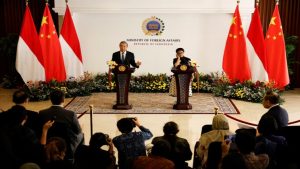This weekend, leaders of seven of the world’s leading democracies will gather in Hiroshima, Japan, a city better known for being hit with a nuclear bomb by the US during World War II on August 6, 1945.
Three days later, on August 9, the US military detonated a second atomic bomb over a second Japanese city, Nagasaki. In the aftermath of the unprecedented nuclear attack by the US on Japan, the cities of Hiroshima and Nagasaki were left counting scores of casualties.
The aerial nuclear bombings in the two cities together killed between 129 000 and 226 000 people. The majority were innocent civilians. To date, the atomic bombings of Hiroshima and Nagasaki remain the only record of any country using nuclear weapons against an opponent. Six days after the second bomb, on August 15, Japan succumbed, and raised a white flag of surrender.
It’s amazing how geopolitical relations can be repaired. This week, the US leads a Group of Seven leading democracies better-known as G7 to an annual summit in the long-rebuilt city of Hiroshima.
The irony of it all is that G7 is not meeting to discuss world peace. They are meeting to put their heads together over how to combine their economic and military might in fighting off geopolitical opponents, perceived or real. They are meeting on the doorstep of China, to discuss ways of restricting China’s political and economic growth and influence in world affairs.
The G7 is described as a non-legal organisation. Call it a “loose” body of the Western democracies that seeks to enforce their ideology on every nation, through persuasion and when all else fails, brute force.
They call it the maintenance of a “rules-based world order”. They make the rules all by themselves and enforce them without any fear of consequences.
The G7 regards its gatherings as more vital than any other. Not even the UN can prevail over the group. Three of the G7 members, UK, US and France, are permanent members of the UN Security Council and therefore possess the veto power to annul any resolution they deem conflictual to the agenda of the entire group.
So powerful is the G7 that at every gathering of their nations’ heads of state, the leadership of the entire pro-G7 bloc, the European Union, is allocated a special seat. This ensures that decisions the G7 take can cascade down seamlessly through the entire EU membership. It is therefore no wonder that basically all the resolutions of the G7 are described in the group’s literature as “international”. They are considered binding at every corner of the universe. Failure to adhere to the G7 wishes, or the boldness to dare the group, is punishable by the combined geopolitical and economic might of the group. Together, they can impose sanctions willy-nilly on any opponent, and craft them in a way that binds all UN member-states regardless.
But, why would the G7 preoccupy themselves with China’s rise in international affairs and set out to counter the sovereign development of a UN member-state in good standing?
The answers vary, in my opinion. They range from the maintenance of the US hegemony and its impact in global affairs. As the world’s biggest economy and the only remaining super-power since the collapse of the Soviet Union at the turn of the 1990s, the US has wasted no time in exercising its unparalleled power as and when and also how it sees fit.
The US foreign policy dictates – premised on “establishing democracy” everywhere, permeate every continent and organisation irrespective of shape or size, even form.
After the satisfaction of winning the Cold War against Russia, China has emerged as the main, if not the only, global threat to the US hegemony. The sudden ramp-up of bilateral relations between the US and Taiwan – globally recognised as a self-governing part of China – provides ample evidence in Washington “countering malign activities” in the region.
Taiwan’s current regime continues to take a gamble on the side of the US, clearly buoyed by Washington’s public declaration of guaranteed economic and military protection in the event of Beijing exercising her right over one of her territories. There can be no crystal clear and bolder declaration of war than that. To borrow from the Cowboys mantra, it’s “bring it on!” They dare China, knowing that according their modus operandi, to dare is to do.
And, to China’s credit, the world’s biggest developing economy continues to remain calm in the midst of public provocations. China’s foreign policy emphasises in particular the need for and importance of dialogue, multilateralism and non-interference in the domestic affairs of other nations, unless otherwise invited.
At this week’s G7 Hiroshima meeting, the outcomes are pretty much predictable. The group will announce more financial and military aid to Ukraine. They will roll out a new barrage of economic sanctions against their pariah, Russia. Using Japan’s geographic proximity to mainland China, they will pledge military and all forms of support to Japan against particularly China’s real or perceived threat to the G7 host country. Finally, they will speak the loudest against Beijing’s “unacceptable” military power in the region, claiming such growth endangers peace and stability not only in the Pacific and East Asia where China is located, but throughout the world.
Other final declarations with regard to issues such as climate change are basically a distraction. The meeting, also attended by G7 members Canada, Italy and Germany, contains at the top of its unannounced behind-the-scenes agenda the containment of China, and final destruction of Russia.
Pity the G7 has not elected to use their combined power and might to provide exemplary leadership in the maintenance of world peace. For these reasons, and this is only my view, the G7’s existence in its current form is a major threat to international peace.






